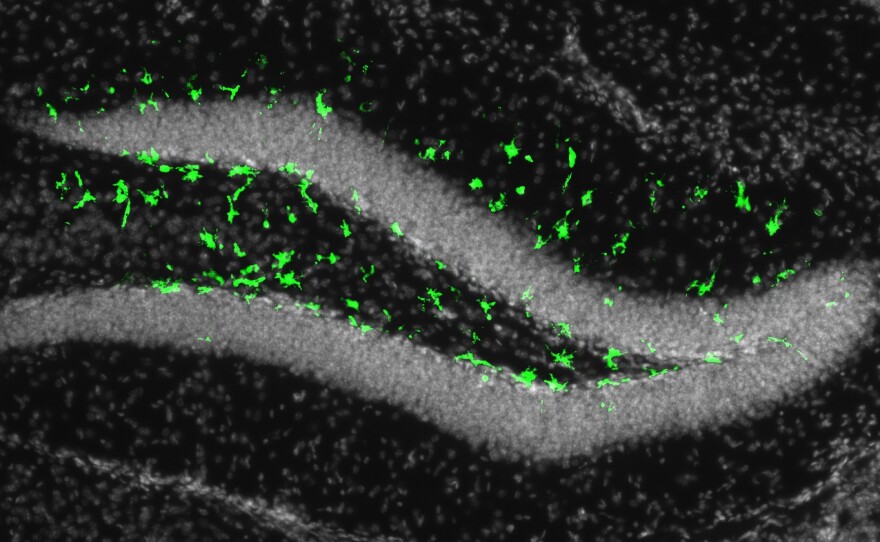For anyone who's seen the images of babies born with shrunken heads, the devastating toll of the Zika virus on the brains of newborns is well-known. But now, local scientists are discovering that the virus could also be affecting the brains of adults.
A study published Thursday in the journal Cell Stem Cell shows that the Zika virus can damage brain cells in a specific strain of adult lab mice. La Jolla Institute for Allergy and Immunology researcher Sujan Shresta co-led the study with Joseph Gleeson of the The Rockefeller University.
"The virus — in this particular mouse strain — gets into the brain and it infects these particular cells called neuronal stem cells. These are cells that eventually become neurons," Shresta said.
The scientists emphasize that more research is needed, and that the long-term effects of Zika infection in adult humans are currently unknown. But they say damage to the brain's stem cells could feasibly result in problems like early onset Alzheimer's disease, depression and learning difficulties.
Most people infected with Zika show no symptoms. But Shresta said this new finding in mice designed to be vulnerable to Zika shows some people, especially those with weak immune systems, could experience long-term neurological damage.
"For most adults, we will be asymptomatic," said Shresta. "Eighty percent of us will never know we even had the infection. But in that 20 percent, one of the consequences could be these bad neuronal outcomes."
Other Zika scientists not involved with the study say these findings provide cause for concern. But they caution that researchers are only just beginning to understand how Zika may be attacking the adult brain.
"We were suspecting this could be the case," said UC San Diego Zika expert Alysson Muotri. "The manuscript does not report any behavioral alteration in infected mice, and it is unclear if the Zika infection persist on the adult brain for long periods."
Though the study is preliminary, Muotri says it shows that scientists should be developing Zika treatments for those already infected, not just vaccines to prevent the virus from spreading.
Muotri believes that if the virus does manage to get into adult brains, it could have "consequences for memory and learning. Similarly, the virus could trigger an inflammatory response that accumulates over time, damaging the brain."
UC San Diego's Jair Lage de Siqueira-Neto, who is currently screening tens of thousands of potential drug candidates for Zika, said it's still unknown whether the virus can cross the blood-brain barrier in healthy adult humans.
"Any long term effect on infected adults would be highly speculative at this point," he said.
Patricia Garcez of the the Institute of Biomedical Sciences and the D'Or Institute for Research and Education in Rio de Janiero said the study "raises awareness of the potential effect of virus in adults and opens an avenue of questions to be answered to translate these results to humans."
Garcez said more experiments should be done using different strains of the Zika virus on mice of varying ages. Shresta said she and her colleagues are planning to carry out those follow-up studies.
For now, Shresta said this research suggests public health efforts shouldn't only focus on preventing Zika infection in pregnant women and their unborn children. She said microcephaly is clearly the most devastating consequence of the virus seen today. But, she said, "Our study suggests it's time we should investigate more into what this virus does in children and adults, not just fetuses."






